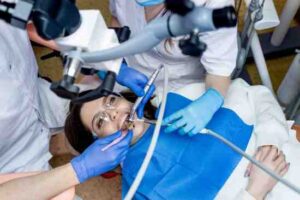Whether it’s a rough tackle, a rogue cricket ball, or a wayward elbow in five-a-side, dental injuries in sport are more common than many people realise. From chipped teeth to full knock-outs, knowing how to react can save your smile. Prevention matters just as much as the cure, so understanding protective gear and quick responses is crucial for athletes of all ages and levels.
Common Dental Injuries Seen in Sport
Mouth injuries can be done in both contact and non-contact sports. Even with precautions in place, accidents happen.
Right after a match, especially if you’re wearing orthodontic treatments like invisalign Kirkcaldy, it’s important to assess for any of the following:
|
Injury Type |
Description |
Immediate Action |
| Chipped or cracked tooth | Surface damage to the enamel | Rinse, protect, see a dentist |
| Dislodged tooth | Tooth pushed out of position | Gently reposition, hold in place |
| Avulsed (knocked out) tooth | Completely out of socket | Place in milk, seek emergency care |
| Soft tissue injury | Cuts to lips, cheeks, gums | Clean with water, apply pressure |
Many athletes wearing aligners like invisalign Kirkcaldy may be at greater risk if they don’t wear protective mouthguards. Aligners are not designed to withstand blunt force.

Why Protective Mouthguards Matter
One of the simplest ways to reduce dental injuries during sport is to wear a properly fitted mouthguard. This is especially true for young athletes with orthodontic treatments or those considering dental implants Kirkcaldy after previous trauma.
Key mouthguard benefits:
- Cushions impact during contact
- Protects teeth and soft tissues
- Prevents dental work damage (e.g. veneers, implants)
- Reduces jaw joint injuries
There are three main types of mouthguards:
|
Type |
Fit & Comfort | Cost Range |
Best For |
| Stock | Ready-made, one-size | Low (£5–£15) | Occasional players |
| Boil-and-bite | Moulded at home | Mid (£10–£30) | School-age athletes |
| Custom-fitted | Made by a dentist | High (£50+) | Regular or high-risk players |
If you’re currently using invisalign Kirkcaldy, remove the aligners and wear a specialised mouthguard for contact sport—don’t use aligners in place of protection.
Disclaimer: The information provided in this table is for general guidance only. For personalised advice on mouthguard selection, please consult your dentist or orthodontist, especially if you are undergoing orthodontic treatment or have existing dental restorations.
How to Respond to a Knocked-Out Tooth
In the situation where Tooth knocked out completely, your response and speed metters alot.
Here’s a step-by-step approach:
- Hold it by the crown, not the root.
- Rinse gently in milk or saline (not water).
- Try to reposition it in the socket. Or else store in the milk or between the cheek and gum.
- Seek emergency dental care within 30 minutes.
Prompt care may allow your dentist to reimplant the tooth, or guide you towards alternatives such as dental implants Kirkcaldy in cases of permanent loss.
Disclaimer: This advice should not replace professional medical attention as this is general.
Post-Injury Treatment Options
Once the initial emergency is addressed, long-term care depends on the injury type. Some common follow-up treatments include:
- Bonding or veneers for chipped teeth
- Root canal therapy for nerve damage
- Crowns or bridges for severe cracks
- Dental implants Kirkcaldy to replace lost teeth
It’s crucial to follow up after even minor injuries, especially if you’re wearing braces or invisalign Kirkcaldy. Invisible aligners may need replacing or adjusting to fit comfortably again after trauma.
Balancing Orthodontics and Sport
Young players or adults undergoing orthodontic treatment often wonder how to continue sport safely. Here’s how:
- Use a specially designed mouthguard over invisalign Kirkcaldy aligners
- Remove aligners during play if possible and store them safely
- Rinse your mouth after matches to clear bacteria and prevent irritation
- Attend regular dental reviews to check alignment and spot issues early
Remember, orthodontic treatment and athletics can coexist with the right protection and habits.
Recognising Signs of Hidden Damage
Not every injury shows immediate symptoms. Here’s what to look out for after an impact:
- Sensitivity to hot/cold
- Loose or wobbly teeth
- Discolouration (grey or dark)
- Persistent gum swelling
- Pain when biting down
If you experience any of these, visit your dentist promptly. Even those considering dental implants Kirkcaldy after trauma need a proper assessment before any procedures.

Preventive Tips for Parents and Coaches
Preventing dental trauma starts with awareness and preparation:
- Ensure young players wear custom-fitted mouthguards
- Teach children not to remove protection mid-game
- Have a first aid kit with saline and gauze ready pitch-side
- Encourage routine dental visits to monitor changes
For teens using invisalign Kirkcaldy, speak to the orthodontist about sport-specific mouthguards or aligner-safe alternatives.
Conclusion
Protecting your teeth during sport doesn’t need to be complicated—just consistent. A quality mouthguard, quick action during emergencies, and proper follow-up make all the difference. Whether you’re undergoing orthodontic care or considering options like dental implants Kirkcaldy, your smile deserves the best protection. At Smilo Dental Implants Group, we’re here to help athletes of all ages keep their focus on the game—not their injuries.









